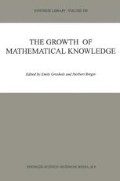Abstract
There is a widespread opinion that prior to the beginning of theoretical mathematics there was only a conglomeration of heterogeneous empirical results dealing with the measurement of areas and volumes and working with the simplest diagrams. In many cases these results had an approximate character and were not related to one another. On this view, empirical material simply accumulated in the mathematics of ancient Egypt and Mesopotamia, while in ancient Greece, mathematical knowledge became a system of interrelated propositions. B.L. van der Waerden’s hypothesis about the existence of theoretical mathematical knowledge in certain nations of Western Europe in the middle of the third millenium B.C. is at first glance quite at odds with this interpretation (van der Waerden 1983). However, his hypothesis also opposes theoretically systematized knowledge to the empirical, unsystematized knowledge of earlier ages. It is considered self-evident that the only way to organize mathematical knowledge, to unite mathematical material, is through the logical derivation of one statement from others. Such an approach to the origin of mathematical knowledge may be defined as a transition “from empirical aggregate to theoretical system.” This approach also appears in a subtle way in N. Bourbaki’s assessment: “…but Babylonian algebra, by virtue of the elegance and reliability of its methods, could not be conceived as a mere collection of problems resolved by empirical groping” (Bourbaki 1960, 9). Bourbaki contrasts the supposedly highly-systematized Babylonian algebra with the conglomerate of fragmentary, unsystematized problems.
Access this chapter
Tax calculation will be finalised at checkout
Purchases are for personal use only
Preview
Unable to display preview. Download preview PDF.
References
Barabashev, A. (1977). “ Metodologicheskie Voprosy Ponyatiinogo Apparata Klassicheskoi Geometrii (Methodological Questions of the Categorial Apparatus in Classical Geometry).” in Philosophico-Sociotogical Problems of Science. Moscow: Moscow State University Press.
Barabashev, A. (1983). Dialektika Razvitiya Matematicheskogo Znaniya (Dialectics of the Development of Mathematical Knowledge). Moscow: Moscow State University Press.
Barabashev, A. (1987). “Dve Vozmozhnye Programmy Postroeniya Matematiki (Two Possible Programs for the Construction of Mathematics).” in Metodologicheski Analis Matematicheskikh Teorii (Methodological Analysis of Mathematical Theories). Moscow: Russian Academy of Science.
Barabashev, A. (forthcoming). Long Cycles in the Development of Mathematics. Modern Logic Publishers.
Bourbaki, N. (1960). éléments d’histoire des mathématiques. Paris: Hermann.
Hilbert, David. (1923). Grundlagen der Geometrie. Leipzig and Berlin.
Kagan, V. F. (1955). “The Construction of Non-Euclidean Geometry in Lobachevski, Gauss and Bolyai,” in (Kagan 1955, 282–292). Lobachevski and his Geometry: Popular Essays. Moscow: Izdatel’stvo tekhniko-teoreticheskoj literatury. (in Russian).
Klein, Felix. (1872). Vergleichende Betrachtungen über neuere geometrische Forschungen Erlangen. Erlangen: Andreas Deichert.
Klein, Felix. (1873). “Über die sogenannte nicht-Euklidische Geometrie,” Mathematische Annalen Volume 6: 112–145.
Norden, A. P. (1955). “Lobachevski’s Discovery and its Place in the History of Modern Geometry, “ in On the Foundations of Geometry. Moscow.
Polischuk, E. M. (1983). Sophus Lie 1842–1899. Leningrad.
Proclus. (1873). Inprimum Euclidis Elementorum librim commentarii. Leipzig.
Rashevski, P. K. (1948). “Hilbert’s ‘Foundations of Geometry’ and its Place in the Historical Development of the Question, ” in (Hilbert 1948, 32) D. Hilbert: “Foundations of Geometry. Moscow: Obshchestvennoe Gosudarstvennoe Izdatel’stvo.
van der Waerden, B. L. (1983). Geometry and Algebra in Ancient Civilizations. New York: Springer-Verlag.
Editor information
Editors and Affiliations
Rights and permissions
Copyright information
© 2000 Springer Science+Business Media Dordrecht
About this chapter
Cite this chapter
Barabashev, A. (2000). Evolution of the Modes of Systematization of Mathematical Knowledge. In: Grosholz, E., Breger, H. (eds) The Growth of Mathematical Knowledge. Synthese Library, vol 289. Springer, Dordrecht. https://doi.org/10.1007/978-94-015-9558-2_21
Download citation
DOI: https://doi.org/10.1007/978-94-015-9558-2_21
Publisher Name: Springer, Dordrecht
Print ISBN: 978-90-481-5391-6
Online ISBN: 978-94-015-9558-2
eBook Packages: Springer Book Archive

